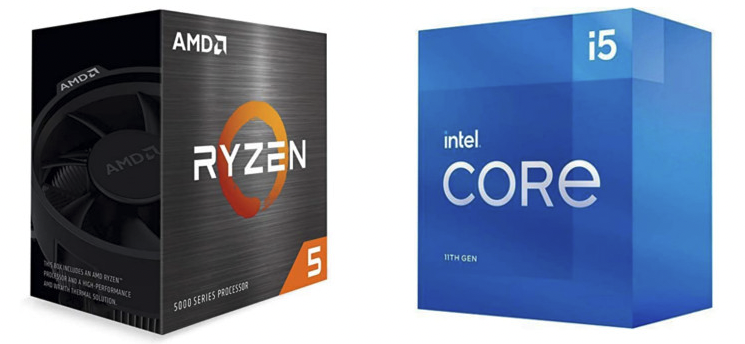The Intel Core i5 and AMD Ryzen 5 are among the top CPUs available on the market in 2024.
Ryzen has been AMD’s most successful CPU launch in recent years.
Ryzen CPUs offer great value for the money and are often compared to Intel’s offerings. The Ryzen 5 line is AMD’s answer to the Intel Core i5 series.
Ryzen 5 CPUs are mid-range processors that offer excellent value for the money. They are often compared to Intel’s Core i5 series.
Related: Core i7 vs. Core i9 – What’s the Difference?
Table of Contents
Types of Ryzen 5
There are several types of Ryzen 5, so let’s take a quick look at them.
We can’t give an exact price of each since those vary regularly, but we’ve included buttons in each description if you’re curious about the cost.
Ryzen 5 2600
The Ryzen 5 2600 is AMD’s most popular Ryzen 5 CPU. It offers 6 cores and 12 threads, with a base clock of 3.4 GHz and a boost clock of 3.9 GHz.
It also comes with a generous 16 MB of L3 cache. The Ryzen 5 2600 is a great choice for gamers who want to game at high resolutions or frame rates, or for anyone who wants to do some serious multitasking.
Ryzen 5 2600x
The Ryzen 5 2600x is a slightly higher-end version of the Ryzen 5 2600.
It offers the same number of cores and threads, but with a higher base clock of 3.6 GHz and a boost clock of 4.2 GHz. It also comes with a larger 20 MB L3 cache.
The Ryzen 5 2600x is a great choice for gamers who want to game at very high resolutions or frame rates, or for anyone who wants to do some serious multitasking.
Ryzen 5 3600
The Ryzen 5 3600 is AMD’s top-of-the-line Ryzen 5 CPU.
It offers 6 cores and 12 threads, with a base clock of 3.6 GHz and a boost clock of 4.2 GHz.
It also comes with a generous 32 MB of L3 cache.
The Ryzen 5 3600 is a great choice for gamers who want to game at extremely high resolutions or frame rates, or for anyone who wants to do some serious multitasking.
Ryzen 5 3600x
The Ryzen 5 3600x is a slightly higher-end version of the Ryzen 5 3600.
It offers the same number of cores and threads, but with a higher base clock of 3.8 GHz and a boost clock of 4.4 GHz.
It also comes with a larger 32 MB L3 cache.
The Ryzen 5 3600x is a great choice for gamers who want to game at extremely high resolutions or frame rates, or for anyone who wants to do some serious multitasking.
Types of Intel i5
There are also several types of Intel i5 CPUs.
Intel Core i5-9600k
The Intel Core i5-9600k is Intel’s top-of-the-line Ryzen 5 competitor.
It offers 6 cores and 12 threads, with a base clock of 3.7 GHz and a boost clock of 4.6 GHz. It also comes with a generous 9 MB of L3 cache.
The Intel Core i5-9600k is a great choice for gamers who want to game at very high resolutions or frame rates, or for anyone who wants to do some serious multitasking.
Intel Core i5-7600k
The Intel Core i5-7600k is a slightly lower-end version of the Intel Core i5-9600k.
It offers 4 cores and 4 threads, with a base clock of 3.8 GHz and a boost clock of 4.2 GHz.
It also comes with a smaller 6 MB of L3 cache.
The Intel Core i5-7600k is a great choice for gamers who want to game at high resolutions or frame rates, or for anyone who wants to do some serious multitasking.
Ryzen 5 vs. Intel i5 – Compatibility and Platforms
Now that we’ve taken a look at the different types of Ryzen 5 and Intel i5 CPUs, let’s compare them.
When it comes to compatibility, Ryzen 5 CPUs are compatible with the AM4 socket, while Intel i5 CPUs are compatible with the LGA 1151 socket.
As far as platforms are concerned, Ryzen 5 CPUs are compatible with the X470, B450, and X370 chipsets. Intel i5 CPUs are compatible with the Z390, H370, B360, and H310 chipsets.
Ryzen 5 vs. Intel i5 – Performance
Now that we’ve taken a look at the different types of Ryzen 5 and Intel i5 CPUs, let’s compare their performance.
When it comes to raw CPU performance, Ryzen 5 CPUs offer better value for the money.
They offer more cores and threads than Intel i5 CPUs, and they also have higher base and boost clocks. Ryzen 5 CPUs also come with more L3 cache, which can help with multitasking and gaming performance.
However, Intel i5 CPUs have a few advantages of their own.
They tend to be more power-efficient than Ryzen 5 CPUs, and they typically offer better single-core performance.
When it comes to gaming performance, Ryzen 5 CPUs are typically the better choice.
They offer more cores and threads, which can come in handy when gaming at high resolutions or frame rates.
Ryzen 5 CPUs also typically have higher base and boost clocks, which can improve gaming performance.
Ryzen 5 vs. Intel i5 – Technical Specifications and Architecture
Let’s compare their technical specifications and architecture.
Ryzen 5 CPUs are based on the Zen+ architecture, while Intel i5 CPUs are based on the Coffee Lake architecture.
Ryzen 5 CPUs are manufactured using the 12nm process, while Intel i5 CPUs are manufactured using the 14nm++ process.
Ryzen 5 CPUs have a TDP of 65W, while Intel i5 CPUs have a TDP of 95W.
As far as technical specifications are concerned, Ryzen 5 CPUs offer more cores and threads than Intel i5 CPUs. They also have higher base and boost clocks, more L3 cache, and a lower TDP.
Ryzen 5 vs. Intel i5 – Pricing and Value
Finally, let’s compare their pricing and value.
Ryzen 5 CPUs are typically more expensive than Intel i5 CPUs.
However, they offer more cores, threads, and L3 cache. They also have higher base and boost clocks.
Ryzen 5 CPUs also have a lower TDP, which can save you money on your energy bill.
All things considered, Ryzen 5 CPUs offer better value for the money.
Ryzen 5 vs. Intel i5 – Productivity
Productivity is an important consideration for many users.
Ryzen 5 CPUs offer more cores and threads than Intel i5 CPUs. They also have higher base and boost clocks.
Ryzen 5 CPUs also come with more L3 cache, which can help with multitasking and gaming performance.
However, Intel i5 CPUs have a few advantages of their own. They tend to be more power efficient than Ryzen 5 CPUs, and they typically offer better single-core performance.
When it comes to productivity, Ryzen 5 CPUs are the better choice for most users.
Ryzen 5 vs. Intel i5 – FAQs
What is the difference between Ryzen 5 and Intel i5?
The main difference between Ryzen 5 and Intel i5 is that Ryzen 5 CPUs offer more cores, threads, and L3 cache.
They also have higher base and boost clocks. Ryzen 5 CPUs also have a lower TDP, which can save you money on your energy bill.
What is the best Ryzen 5 CPU?
The best Ryzen 5 CPU is the Ryzen 5 3600. It offers 6 cores and 12 threads, with a base clock of 3.6 GHz and a boost clock of 4.2 GHz.
It also comes with 32 MB of total cache (L3 + L2).
What is the best Intel i5 CPU?
The best Intel i5 CPU is the Intel Core i5-9600K. It offers 6 cores and 6 threads, with a base clock of 3.7 GHz and a boost clock of 4.6 GHz.
It also comes with 9 MB of total cache (L3 + L2).
What is the difference between Ryzen 5 and Intel i7?
The main difference between Ryzen 5 and Intel i7 is that Ryzen 5 CPUs offer more cores, threads, and L3 cache.
They also have higher base and boost clocks.
Ryzen 5 CPUs also have a lower TDP, which can save you money on your energy bill.
Additionally, Ryzen 7 CPUs are typically more expensive than Intel i7 CPUs.
Summary – Ryzen 5 vs. Intel i5
As you can see, there are some great choices available if you’re looking for a powerful CPU for gaming or to build a productivity workstation.
Ryzen 5 CPUs are the better choice for most users. They offer more cores, threads, and L3 cache.
They also have higher base and boost clocks. Ryzen 5 CPUs also have a lower TDP, which can save you money on your energy bill.
Intel i5 CPUs are more power-efficient than Ryzen 5 CPUs, and they typically offer better single-core performance. However, they tend to be more expensive than Ryzen 5 CPUs.
When it comes to productivity, Ryzen 5 CPUs are the better choice for most users.
If you’re looking for the best value for the money, Ryzen 5 is the way to go.


